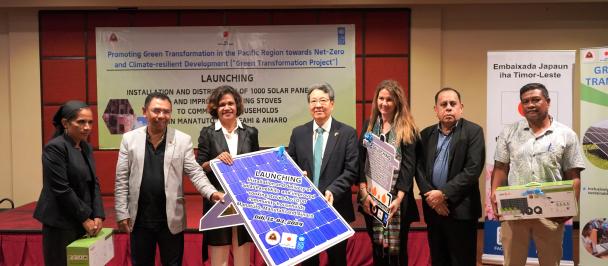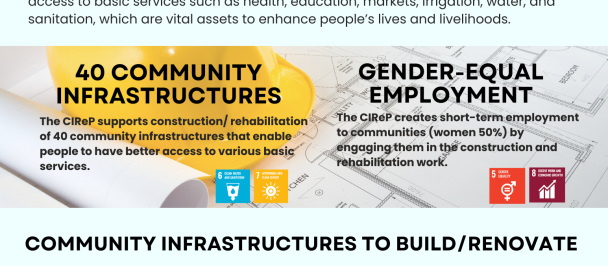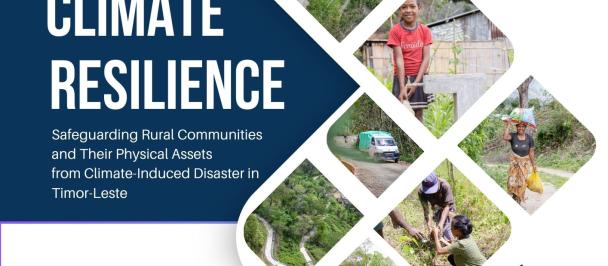While rain was still falling during the Easter Sunday floods, the UNDP began its emergency response to support displaced people with essential humanitarian support.
Easter Cyclone: UNDP Timor-Leste’s Emergency Response Reaches over 8,000
April 13, 2021
Soldiers clean up the flood waters and mud at the Presidential Palace in Dili, Timor-Leste. Photo: Alex Ray/UNDP Timor-Leste
The strongly catholic population of Timor-Leste now has a new Easter tragedy to mourn.
The cyclone that passed over the island on the night of Saturday the 3rd of April displaced tens of thousands and killed dozens. One week on from the disaster, which affected the whole country, many have also been left traumatised by the experience.
Sunrise over Timor-Leste on Sunday April 4 revealed rising flood waters of up to 1.5 metres in low-lying areas. Many had been awake for hours as flood waters entered their houses as early as 3am.
It had been raining the whole week leading up to the weekend and it peaked with strong winds and over 400mm of rain throughout Saturday night. Torrential rain continued into Sunday morning and was predicted to continue until Monday.
With stranded communities watching on, many streets became fast flowing rivers and hazardous debris was strewn throughout the city. Infrastructure and houses were damaged by floodwaters and landslides in every municipality and many essential roads connecting towns were severely damaged.
Roads to many areas were inaccessible by any emergency services and communities were left to fend for themselves, seeking shelter and high ground, leaving behind everything they owned. Floodwaters swept away vulnerable housing and the rain caused landslides, killing or critically injuring many.
In Timor-Leste’s capital Dili, the extent of the flooding was so wide that no one was unaffected by hazards including landslides, road collapses, falling trees, and power lines.
With UN House in Dili also heavily flooded, several UNDP staff quickly mobilized to gather at Hotel Timor in central Dili to begin emergency relief efforts. By midday on Sunday it was still raining but began to ease.
As the rain eased throughout Sunday afternoon, volunteers, some of whom were sheltering in Hotel Timor after being displaced from their homes, set up a cooking production line in the hotel and were able to supply 500 people at emergency shelters with hot nutritious meals.
Power and mobile networks were cut for most of the population and as they returned gradually, images began to spread about the full extent of the damage. Whole sections of road and bridges had washed away, cars were completely submerged, trees and flood waters cut off communities.
In many areas, the most vulnerable such as those living in poor quality housing, women with children, people with disabilities, and those without support networks were hit the hardest.
Flood waters began to drain away on Monday under threatening cloudy skies, while damage assessments and emergency relief began on a mass scale. The UNDP focused on water, hot meals, and sanitation by providing food and installing water tanks at emergency relief shelters. With the help of tireless work by volunteers and staff, the UNDP was able to provide 2,000 hot meals with drinking water per day.
As of April 9, over 13,000 Timorese have been displaced in Dili alone, with further damage and displacement across 12 municipalities. Many of them lost their homes, possessions, and food.
At least 42 people have died as a result of the floods. In the middle of a worsening Covid-19 lockdown, those seeking shelter have been gathered in crowded emergency facilities with little hygiene or emergency preparedness.
UNDP support has reached at least 8,652 people in 15 different communities, organisations, and shelters throughout the first week of the response, with 11,630 hot nutritious meals, 11, 640 water bottles, 40 cartons of milk; 11 1100L water tanks; one 3200L water tank benefitting at least 500, and 10kg of rice for 100 households in Baucau. Fourteen UNDP staff households (53 people) were also displaced and have received food and essential support.
With daily relief continuing, nearly $100,000 has been spent on essential needs this week. Communities across Dili and Timor-Leste have also worked with whatever they have had available to begin the long process of cleaning and recovery from the floods.
After the floods new hazards have emerged, including excessive dust, explosions in disease-bearing mosquito populations and a heightened risk of Covid-19 transmission. These are just some of the knock-on effects which are being exacerbated by extreme weather and other effects of climate change in vulnerable nations like Timor-Leste.
UNDP continues to coordinate with the Government of Timor-Leste and development partners to provide the most effective relief. As of Saturday April 10, communities in areas such as Tasi Tolu in Dili’s west were still cut off without access to clean water or food. UNDP and Unicef supported local authorities and the fire brigade to provide water tanks and potable water to support the emergency sanitation and hygiene needs of the community.

 Locations
Locations



